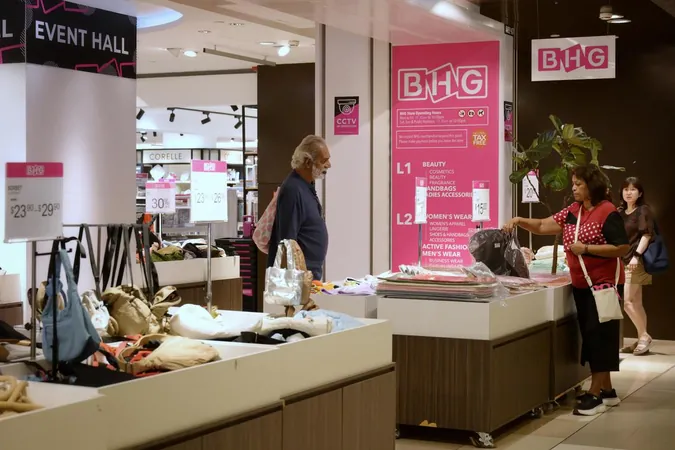
BHG Shrinks Iconic Bugis Junction Store Amid Department Store Decline
2025-06-07
Author: Rajesh
In a surprising turn of events for Singapore’s retail landscape, department store giant BHG is pulling back on its flagship outlet at Bugis Junction, reducing its presence from three levels to just two. This strategic downsizing marks a significant moment, as it represents BHG's last remaining permanent store after the closure of its Junction 8 location earlier this year.
The vacuum left by BHG is quickly being filled by the home decor brand Nitori, which will occupy the third floor of Bugis Junction, indicating a shift in consumer interests toward home furnishings.
BHG isn’t the only major retailer navigating troubled waters; it has shut down four stores across Singapore since 2022, including those in Raffles City, Jurong Point, and Lot One. The closure trend reflects a broader decline in the department store model, not just for BHG but across the industry.
A spokesperson for Bugis Junction confirmed the store's reduced footprint, stating, "BHG remains a tenant at Bugis Junction on Levels 1 and 2, and we continue to work closely with them to introduce new brands.” Meanwhile, BHG has been tight-lipped about its future plans despite the downsizing.
Gone are the days when shopping meant spending hours wandering through massive department stores. Brenda Thio, a homemaker in her 50s, shared her sadness about the decline of longstanding retail institutions, though she admitted that she primarily shops online now, visiting BHG for the occasional bedding purchase.
The Retail Apocalypse: A Global Trend
The challenges facing BHG are part of a larger global trend affecting department stores. The pandemic accelerated the switch to online shopping, with more consumers opting for the convenience it offers. Japanese retailer Isetan plans to close its Tampines Mall outlet after nearly 30 years, leaving it with just two stores in Singapore. Other local banners like OG and Metro have also reduced their footprints or exited certain markets entirely.
Industry experts point to the e-commerce boom as a significant factor driving customers away from traditional department stores. Today’s shoppers are demanding curated experiences tailored to their preferences—something that large generalist retailers struggle to provide.
From Department Stores to Specialty Malls
Malls are increasingly filled with niche retailers that cater to specific interests, from fashion to homeware, providing focused brand experiences that resonate better with modern consumers. Professor Lawrence Loh from NUS Business School highlighted this shift, suggesting that department stores must differentiate themselves from specialized outlets or risk becoming irrelevant.
Reinventing the Shopping Experience
So what can save department stores in this evolving marketplace? The answer may lie in merging physical spaces with appealing digital experiences. Experts propose innovative ideas, like offering exclusive in-store events, personalized shopping experiences, and integrating technology such as augmented reality fitting rooms.
Additionally, BHG and other retailers can look to collaborate with unique brands that aren’t widely available in Singapore, providing elements that attract customers back into stores. Creative marketing initiatives that engage the community can also build loyalty, such as supporting local charities or hosting cultural events.
Ultimately, for department stores like BHG to thrive in this competitive climate, they need to pivot from a product-centric approach to a more experience-centric one, recognizing and adapting to the shifting values and behaviors of today’s consumers.



 Brasil (PT)
Brasil (PT)
 Canada (EN)
Canada (EN)
 Chile (ES)
Chile (ES)
 Česko (CS)
Česko (CS)
 대한민국 (KO)
대한민국 (KO)
 España (ES)
España (ES)
 France (FR)
France (FR)
 Hong Kong (EN)
Hong Kong (EN)
 Italia (IT)
Italia (IT)
 日本 (JA)
日本 (JA)
 Magyarország (HU)
Magyarország (HU)
 Norge (NO)
Norge (NO)
 Polska (PL)
Polska (PL)
 Schweiz (DE)
Schweiz (DE)
 Singapore (EN)
Singapore (EN)
 Sverige (SV)
Sverige (SV)
 Suomi (FI)
Suomi (FI)
 Türkiye (TR)
Türkiye (TR)
 الإمارات العربية المتحدة (AR)
الإمارات العربية المتحدة (AR)